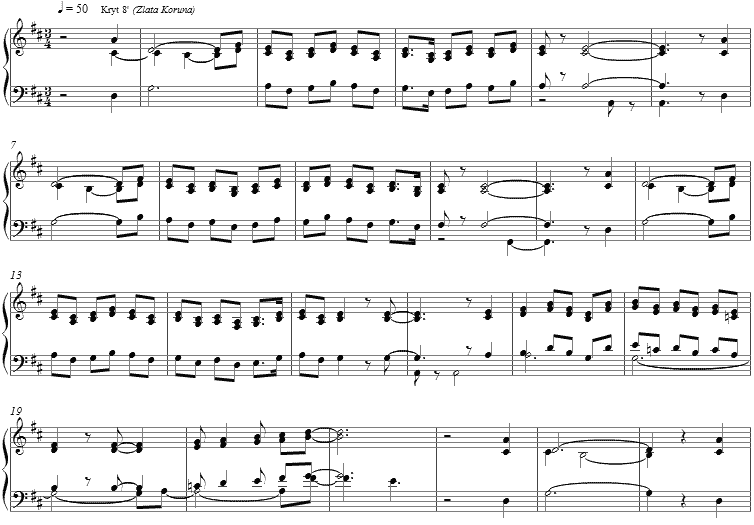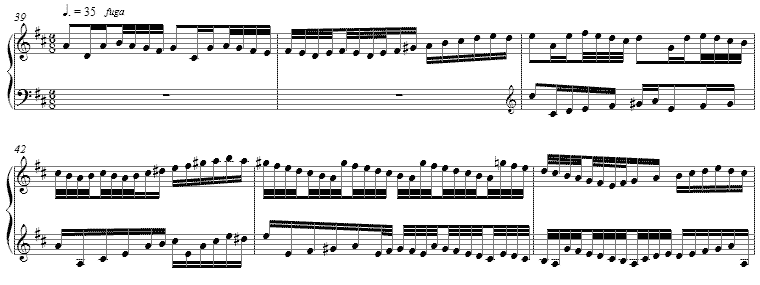Music and Texts of GARY BACHLUND
Vocal Music | Piano | Organ | Chamber Music | Orchestral | Articles and Commentary | Poems and Stories | Miscellany | FAQs
Prelude and Fugue in D major - (2008)
for organ
for Jiri Zurek
In the continuing advance of sound technology, a number of virtual pipe organs have been created allowing enthusiasts of this instrument to have fine sound samples for practice purposes other than in a church or music conservatory. To this end, the Institute for Classical Studies of the Academy of Sciences of the Czech Republic has been documenting historic instruments in that nation, Jiri Zurek [ 1 ] leading in this endeavor. The sample sets are in fact recordings of individual pipes, and not synthesized sounds, very faithfully reproducing the instrument and its acoustic environment.
From his sound samples which he allowed me to use, there is a delightful single stop [ 2 ] in a church with a long reverberation which by its sweet sound simply suggested this opening gesture to me, such that the prelude was written in an hour, and the fugue later the same evening. That a single stop was the foundation of this work, I chose to set the entire work as a keyboard piece without pedal. It is therefore accessible to portative and salon organs, as well.
While the prelude is in triple meter, the fugue based on the falling fifth of the prelude's opening gambit is in a lilting 6/8, and the short subject extended through a simple sequence and modulating gesture which follows.
The entire work is here,
, an MP3 file [ 3 MB, 3' 13" ]
The score for Prelude and Fugue in D major is available as a free PDF download, though any major commercial performance or recording of the work is prohibited without prior arrangement with the composer. Click on the graphic below for this organ score.
NOTES
[ 1 ] Jiri Zurek (b. 1974) graduated in 1992 from United World College of the Adriatic, Duino, Italy, with an International Baccalaureate Diploma. Following this, he was a theological student at Litomerice, Czech Republic, while serving as cathedral co-organist of Litomerice, and in 1998 graduated from Charles University earning his Magister degree. He is currently a researcher at the Institute for Classical Studies of the Academy of Sciences of the Czech republic, working on "Documentation of the Cultural Heritage of the Czech Lands up to 1800", "Knihopis Digital" and the "Liturgical Manuscripts of the Utraquist Provenance. Zurek is also a member of vocal consort Gontrassek, a post-graduate student at Palacky University, Olomouc, and assistant professor at Charles University, Theological faculty. In 2006, he completed his post-graduate studies, earning his "Sacrae Theologiae Licentiatus" - ThLic. - and in 2007 earned his "Doctor Sacrae Theologiae" - Th.D. " Sonus Paradisi's first sample set appeared in 2003, later adding to the larger Hauptwerk.cz project.
The Virtual Pipe Organ Project offering historic "virtual" organs from the Czech Republic is named Sonus Paradisi, and sound samples which inspired this composition may be found at the site by clicking on the name itself. For my purposes as composer, I employ these samples through the MyOrgan program (now no longer offered), though more sophisticated players employ the Hauptwerk virtual organ program to play such sound samples.
[ 2 ] The stop sample is named Kryt. Jiri Zurek clarifies the Kryt "is the wooden stopped flue pipe of rather thin scale (mensura). Literally, the Czech word Kryt means the same as German Gedackt, it simply means "covered" (i.e., stopped pipe). So, it is rather generic name of a stop. The Czech Kryt can also be described by the Latin name Copula, Kopula, Koppel, I even saw the spelling "Koputa." It is all the same thing, although the scale may vary from organ to organ giving slightly different timbre."

